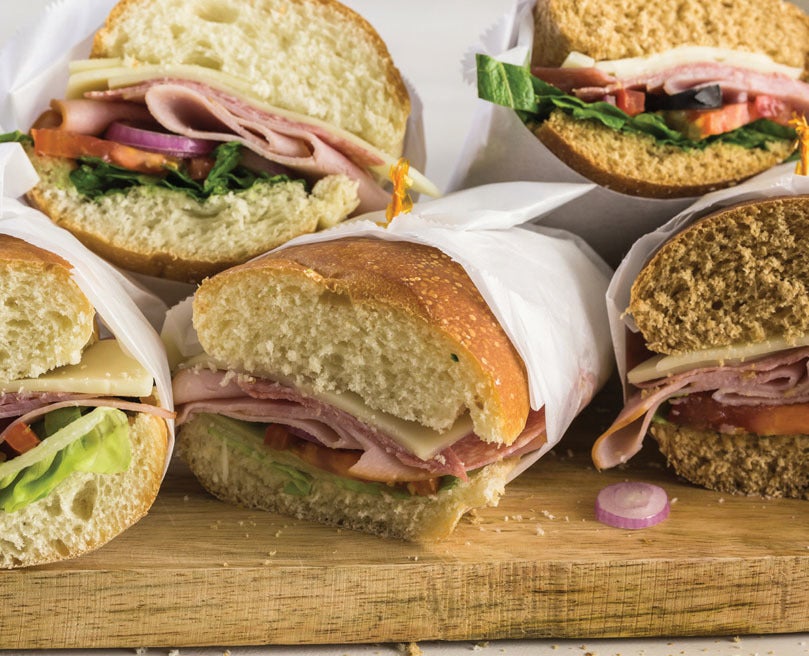
Michael Eckhardt
VICE PRESIDENT — CHIEF RISK OFFICER, GENERAL COUNSEL, AND SECRETARY
WAWA, INC.
WAWA, PA, USA
When Michael Eckhardt joined Wawa in 2005 from a law firm, the firm’s partners teased him that he would soon get bored being an in-house lawyer for a coffee-and-hoagie shop. Fifteen years later, he can confidently say they couldn’t have been more wrong.
Now Wawa’s senior vice president – chief risk officer, general counsel, and secretary, Eckhardt has helped the iconic mid-Atlantic convenience store chain navigate class action lawsuits, restructure from a C corporation to an S corporation, and expand into the new market of Florida, which included designing and financing a tug-barge to bring gasoline from refiners in the Gulf. He has worked on table top exercises on the company’s key operational risks and is now part of a team handling the evolving COVID crisis. He’s anything but bored.
Associates are essential
Wawa, which has more than 36,000 associates in 900 stores across six states and Washington, DC, was declared an essential provider from the outset of the pandemic. Eckhardt and his team responded to a mix of local and state safety protocols and regulations while also adjusting to changing business demand.
The company, already known for its clean and tidy stores, implemented a “clean force” that sanitized customer touch points. It installed plexiglass immediately and instituted a company-wide mask and glove mandate by mid-April.

A PTO relief plan was rolled out to ensure every associate had two weeks of coverage in case they or a family member were exposed to the virus. That policy provided the flexibility to close a store if a case was confirmed in that store. “We close minute one,” Eckhardt says, explaining that the stores undergo a deep clean and contact tracing for potential exposure before reopening.
Each Wawa store has prominent signage, including on the company’s ubiquitous digital displays, that remind customers about local mask ordinances. Associates are taught to de-escalate a situation if a customer does not comply; Eckhardt notes that industry groups strongly prefer the de-escalation method, which has been part of the Wawa training since 2018.
Eckhardt knows that the backbone of Wawa is its associates — in fact, associates own 40 percent of the privately-held, US$10 billion company. “Corporate is there to support our store teams,” he explains. Associates are automatically enrolled in an ESOP, or employee stock ownership plan, after they work for Wawa for one year, reach 1,000 hours of work, and are over age 18. “When you walk into a Wawa, you’re often talking to an owner,” Eckhardt points out. Eight to 12 percent of an associate’s wage is invested in the ESOP, leading to a long-tenured workforce that provides opportunities that don’t exist at other companies (and a chance for many associates to retire early).
When Wawa first expanded beyond the mid-Atlantic to Florida, the company moved whole store management teams, some with managers with over 20 years of experience, to open the new stores.
Embracing change while balancing short- and long-term risk
The company has not permitted recent operational challenges to detract from the company’s focus on strategic risks. “As a management team, we’re trying to balance the short-term goals of running the business and being there for our community today, while also preparing for our future and constantly innovating,” Eckhardt explains. He notes that Wawa has teamed up with Tesla to install electric charging stations at certain Wawa stores as electric cars gain market share. With travel plans and commutes disrupted by the pandemic, Wawa is looking at non-fuel stores that have opened in metro centers like Washington, DC, Philadelphia, and Vienna, VA to compete with fast-casual chains. The company is piloting a drive-through concept that will require a reworked menu to get customers through the line in the industry-gold standard of four minutes.
Getting to know… Michael Eckhardt
IS THERE ONE THING THAT YOU MISS FROM BEFORE COVID, AND IS THERE ONE THING THAT YOU DON’T MISS?
As a family, we miss traveling. We love seeing different parts of the country and different parts of the world. As baseball fans, we have attended games at all but five of the major league stadiums. We were planning to knock Toronto, Detroit, Cincinnati, and Cleveland off the list this summer. Hopefully, this is a possibility next year.
I feel conflicted about my commute — while it’s 35 minutes of driving through horse country, that is 70 minutes I get back every day. At the same time, I do miss it because it gave me the ability to plan for the day on the way in and decompress on the drive home. Now, because everyone thinks everyone is always working, you are getting texts at 6 am when you are trying to ride the Peloton for 30 minutes in the morning.
DO YOU HAVE ANY FREE TIME RIGHT NOW?
My free time is in the morning. I will read the Wall Street Journal and ride on my spin bike.
We’re walking more as a family now and spending quality time together. There is always a positive side of any situation — we just need to look for it, and we try to remind our two teenagers of that daily.
The company is embracing change in other areas as well, from meal delivery to digital connections with their customers.
Eckhardt credits Senior Legal Counsel Tara Gibbons for coordinating the legal review with delivery app companies like Uber Eats and DoorDash to bring the chain’s hoagies to customers. The option existed in about a third of stores before the pandemic, but Gibbons worked quickly to enable the company’s digital team to expand the option and answer other questions, such as how to deliver alcohol in jurisdictions where it’s permitted.
To see what other CLOs are talking about, please visit www.acc.com/clo.
The company can never rest on its laurels because of its competition. At breakfast, Wawa spars with McDonald’s for breakfast sandwiches and Dunkin and Starbucks in the coffee market. At lunch, it’s up against Subway or Chick-fil-A. And it’s also competing for customers in the convenience store space with 7/11 and other regional brands.
Data protection is another area where the chain needs to carefully evaluate risk.

Kathy Dickinson, Wawa’s associate general counsel, works very closely with the marketing department to understand what technology is available for gathering and protecting data, while also being mindful that there is an “ick” factor to harvesting too much data. In December 2019, Wawa announced a security incident that affected customer payment card information at its stores after discovering malware on Wawa’s systems. Wawa made the announcement to its customers nine days after discovering the malware, removing it from Wawa’s system, and notifying regulators.
The legal team has always needed to move swiftly to support innovation, which is a key pillar of Wawa’s corporate ethos. What started as a convenience store and grocery in New Jersey morphed into a gasoline-hoagie shop hybrid and is now becoming more focused on healthier food and products. The legal department will continue to support the business as it evolves.
Being prepared for “the bread truck”
Eckhardt draws on the tenure of his legal department — his direct reports have 44 years of Wawa experience among them, showing that it’s not only the store associates who tend to stick around for a long time. He knows that his team can step up if he’s “hit by the bread truck” as they say around headquarters.
Eckhardt has always been familiar with Wawa; he grew up in Philadelphia, and moved to nearby Bucks County, PA, for high school, where Wawa stores seem to be on every other block. After becoming disillusioned by politics while an undergrad in Washington, DC, at American University, he had a conversation with an older friend who was pursuing law school. “It was one that made you think about your life and where I wanted to end up,” he reflects. Knowing that he wanted to be near his large family, which was back in Philadelphia, he decided going to law school in the City of Brotherly Love would give him the best shot at landing a job close to home after graduation. After earning his degree from Temple, he worked at firms in Philadelphia until a fateful January day when the head of the labor and employment group walked into his office and shut the door. Instead of delivering bad news as Eckhardt expected, the partner urged him to apply for a position with Wawa.
After starting his in-house role in 2005, he was promoted to general counsel in 2011. His role has expanded over the years. Wawa CEO Chris Gheysens promoted him to the company’s 10-person management team in 2014 and created a legal and risk department, which includes quality assurance, risk management, safety, loss prevention, internal audit — “all the stuff nobody seems to want,” Eckhardt jokes. It’s a job he relishes, and one that keeps him occupied with much more than coffee and hoagies.
ACC EXTRAS ON… Change management
ACC Docket
In-house at Home: Uncertainty and Change Management (May 2020).
The Art of Change Management and Driving User Adoption: An ACC Legal Operations Virtual Roundtable (Sept. 2019).
Article
ACC Legal Operations Change Management: Mastering the Change Curve—Theoretical Background (Oct. 2018).
ACC HAS MORE MATERIAL ON THIS SUBJECT ON OUR WEBSITE. VISIT WWW.ACC.COM, WHERE YOU CAN BROWSE OUR RESOURCES BY PRACTICE AREA OR SEARCH BY KEYWORD.



